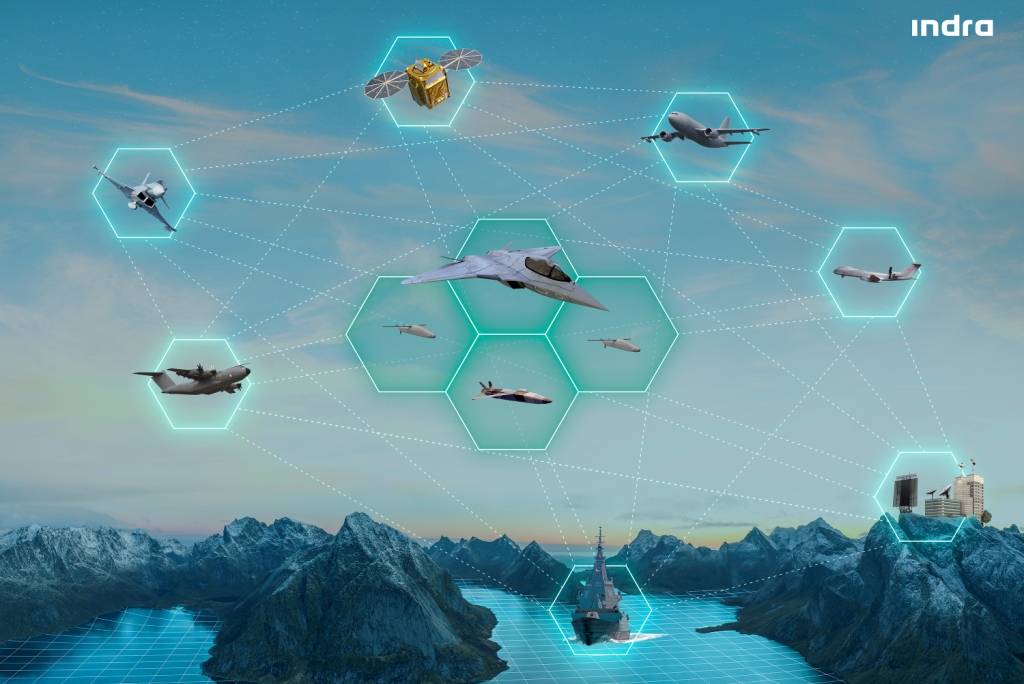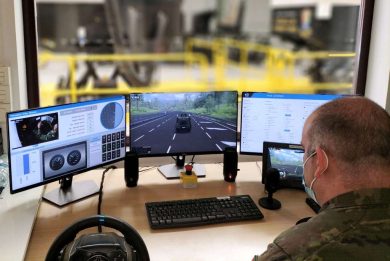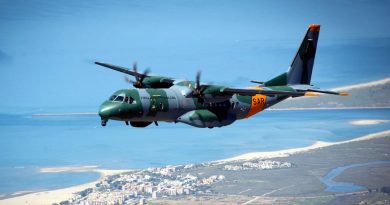
Indra: the launch of Phase 1B of the Future Combat Air System consolidates the largest European defence program under Indra’s leadership in Spain
Madrid, December 15, 2022 – Indra, a leading global technology and consulting company, has signed, as a co-contractor and national industry leader, the contract for the Phase 1B of the Next Generation Weapon System within Future Combat Air System (NGWS/FCAS) program, which will address architecture selection, concepts development, technology maturation and validation through demonstrations.
Indra, as national coordinator of the program in Spain (which participates on an equal footing with France and Germany, which have their respective national coordinators, Dassault Aviation and Airbus Defence and Space Germany), will be responsible for promoting and coordinating Spanish industrial participation, encouraging the development of companies and SMEs in the sector, and the entire innovative ecosystem, with universities and research centers at the forefront. The contract will involve the contracting of more than €600M to Indra in various projects to be executed over the next three years. Indra will have a headquarters and a work center dedicated exclusively to the FCAS project.
Indra CEO Ignacio Mataix stated: “The development of the Next Generation Weapon System (NGWS), one of the main ingredients of the Future Combat Air System (FCAS), consolidates Indra as the coordinator of the Spanish industry and one of the great technological leaders of European defence, thanks to the outstanding capabilities of our company in the development of state-of-the-art technological systems, electronic warfare, radars, mission and integrated command and control and aerospace defence systems, new space, simulation and cyberdefence, among others. As co-responsible with the other two national coordinators for the transversal activities that consolidate the architecture of the NGWS system of systems and give coherence to the developments of the technological pillars, international leader of the Sensors pillar and with national responsibility for the Combat Cloud pillar, Indra’s leadership extends to the most technological domains of the largest European defence project”.
“This system of systems is not only intended to replace fighters currently in service, but to form the core of a combat system that includes, in addition to a new-generation fighter, unmanned platforms, sensors, low observability technology and, above all, a combat cloud that will enable the collaborative operation of all these assets, managing all air combat information and, in the future, the entire digital battlefield. As an integral part of the team that developed and is still updating the great European fighter, the Eurofighter, I am proud to think that Indra will participate on an equal footing with Dassault Aviation (France) and Airbus Defence and Space (Germany) in the design of this innovative weapon system. It is undoubtedly an unprecedented milestone for European and Spanish defence and for Indra, from which the rest of the industrial fabric will benefit. Since Spain joined the FCAS project two years ago, the Indra team has always felt the backing and support of the Secretary of State for Defence and the General Directorate of Armament and Materiel (DGAM), in a project that will benefit the entire national industry and will boost our RDI. The digital transformation of defence is underway, and Indra is at its core,” said Indra CEO Ignacio Mataix.
“This is excellent news for Indra and for the entire industrial ecosystem in our country. Likewise for the future of technology enablement and R&D in Spain. Let’s remember that many of the technologies that we are going to develop as part of this ambitious program will have other industrial uses in the civilian field that both Indra and Spain will take advantage of. The FCAS is a cutting-edge project, in which we will have to design an ambitious technological future, and in which large companies, SMEs, technology centers and universities will have to work together. It is also destined to be a success story of public-private collaboration. I would also like to thank the Ministry of Defence for their strong support in all the stages we have gone through together until the signing and notification of the contract for this FCAS Phase 1B and for their vision in driving this project from the beginning,” remarked Indra’s chairman Marc Murtra.
Technological definition of the project, the horizon of Phase 1B
The new Phase 1B will address the evolution and maturation of next-generation technologies (propulsion, maneuverability, interconnected and distributed sensors, next-generation communications, Cloud services, Edge Computing, artificial intelligence, low observability, interoperability, etc.), which will make NGWS/FCAS the most advanced air combat system of systems in the world, while facilitating and promoting the digitalization of the sector and the birth of new dual technologies, with military and civilian application in different sectors.
The defence industry is witnessing a paradigm shift from the traditional, independently operated fighter jet to an interconnected “system of systems” comprising a Next Generation Fighter (NGF), various unmanned platforms, remote carriers (RC), and a Combat Cloud. This Combat Cloud will be the enabling element of the system of systems that, relying on Advanced Connectivity means (Intra-vehicle Wideband datalinks, Satellite, Opportunistic, Optical…), will allow a high availability of information and, thanks to the application of Artificial Intelligence, Big Data and Edge Computing, will convert that information into knowledge, enabling Collaborative Combat and Air superiority through unprecedented Multi-platform collaborative capabilities and services.
There will be developments of improved low observability techniques in fighter and remote carriers, engine, communications or mission sensors, among others. This program will push multi-function sensor technologies to the next level in a Multiplatform Suite of networked collaborative sensors, will have an enhanced cockpit with crewmonitoring, new visualization systems and fully disruptive Human-Machine Interfaces.
These technologies will be validated in different demonstrators (engineering simulations and validations, technological demonstrations and validations, as well as flight tests) until they reach the degree of maturity required for their subsequent implementation in the final design. During Phase 1B, the foundations will be laid for Phase 2, which will last another three years and will continue the program until 2029, ending with a functional demonstrator. The first flight demonstrations are planned for around 2028, with the ultimate goal of the system entering service in 2040.
Giant leap for the Spanish industry
The signing of this contract represents a shared success: Spanish industry has consolidated an equal position in terms of both the quantity and quality of the work to be tackled by the French and German industries. This important participation will give a strong boost to the entire Spanish business and innovative industrial fabrics, as it will require the incorporation of SMEs, universities, technology and research centers from all over the country into the project.
Early participation in the maturation of a wide range of dual technologies beyond the state of the art will have a major impact on the entire value chain of Spanish industry, improving its competitiveness, promoting the digital transformation of the sector, and achieving a role of maximum importance in Europe. In this regard, Indra, as national coordinator, also works to ensure the maximum return of the program for our country and to guarantee national sovereignty over the technologies that the Ministry of Defence has defined as critical.
The recently launched Phase 1B will also represent an opportunity for the development of the national talent and own technological capabilities with the creation of more than 1,000 highly skilled jobs in Spain, more than 400 of them at Indra, to which will be added all the indirect jobs generated through subcontracting, purchases and related services. Spain will participate in 33% of the technological developments of the entire program, leading some of the key activities.
Indra consolidates its position as a global leader in state-of-the-art defence technologies
In addition to its role as national industrial coordinator, the Phase 1B contract positions Indra as one of the major European defence technology leaders, with a prominent participation in the FCAS program and a leading role in the technology pillars.
Indra is leading the Sensors pillar on an international scale, as prime contractor, and will have Thales and the German consortium FCMS as main partners. This pillar is set to revolutionize the industry with a multi-platform suite of networked sensors that will offer collaborative capabilities and services that will multiply the value of data and contribute to mission success.
In the Combat Cloud pillar, Indra is the national leader and will work with Airbus Defence and Space Germany, as prime contractor, and with Thales as partner for the joint development of the key enabler element of the System of Systems concept that enables unprecedented collaborative capabilities between connected platforms
The two transversal pillars, which will undertake the definition and selection of the final architecture at the System of Systems level (NGWS), as well as the whole demonstration and global validation process at the NGWS level, are internationally co-led by Indra, Dassault Aviation and Airbus DS Germany.
Finally, Indra co-leads the definition and deployment of a secure digital environment for classified information for collaborative work for the program, together with the rest of the program’s co-contractors.
For its part, Airbus DS Spain is leading, nationally, the participation in the NGF, and internationally, a technological pillar focused on low observability technologies; ITP Aero is leading national participation in the NGF Engine; and SATNUS, a consortium comprising the Spanish companies GMV, Sener and Tecnobit, is leading national participation in the Remote Carriers and Manned-Unmanned Teaming (MUT) pillar, following the same industrial scheme already established for Phase 1A.
Image courtesy Indra



